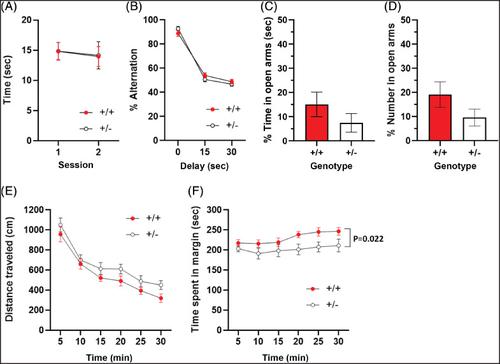当前位置:
X-MOL 学术
›
Genes Brain Behav.
›
论文详情
Our official English website, www.x-mol.net, welcomes your
feedback! (Note: you will need to create a separate account there.)
Heterozygosity of murine Crkl does not recapitulate behavioral dimensions of human 22q11.2 hemizygosity
Genes, Brain and Behavior ( IF 2.4 ) Pub Date : 2020-12-02 , DOI: 10.1111/gbb.12719 Takahira Yamauchi 1 , Gina Kang 1 , Noboru Hiroi 1, 2, 3
Genes, Brain and Behavior ( IF 2.4 ) Pub Date : 2020-12-02 , DOI: 10.1111/gbb.12719 Takahira Yamauchi 1 , Gina Kang 1 , Noboru Hiroi 1, 2, 3
Affiliation

|
Deletions in 22q11.2 human chromosome are known to be associated with psychiatric disorders, such as intellectual disability, schizophrenia, autism spectrum disorder, and anxiety disorders. This copy number variation includes a 3.0 Mb deletion and a nested proximal 1.5 Mb hemizygous deletion in the same region. Evidence indicates that the distal 22q11.2 region outside the nested 1.5 Mb deletion also might be contributory in humans. However, the precise genetic architecture within the distal region responsible for psychiatric disorders remains unclear, and this issue cannot be experimentally evaluated beyond the correlation in humans. As CRKL (CRK-like Proto-Oncogene, Adaptor Protein) is one of the genes encoded in the distal 22q11.2 segment and its homozygous deletion causes physical phenotypes of 22q11.2 hemizygous deletion, we tested the hypothesis that its murine homolog Crkl contributes to behavioral phenotypes relevant to psychiatric disorders in mice. Congenic Crkl heterozygosity reduced thigmotaxis, an anxiety-related behavior, in an inescapable open field, but had no apparent effect on social interaction, spontaneous alternation in a T-maze, anxiety-like behavior in an elevated plus maze, or motor activity in an open field. Our data indicate that the heterozygosity of murine Crkl does not recapitulate social deficits, working memory deficits, repetitive behavior traits or hyperactivity of human 22q11.2 hemizygous deletion. Moreover, while 22q11.2 hemizygous deletion is associated with high levels of phobia and anxiety in humans, our data suggest that Crkl heterozygosity rather acts as a protective factor for phobia-like behavior in an open field.
中文翻译:

小鼠 Crkl 的杂合性不能概括人类 22q11.2 半合性的行为维度
已知 22q11.2 人类染色体中的缺失与精神疾病有关,例如智力障碍、精神分裂症、自闭症谱系障碍和焦虑症。这种拷贝数变异包括同一区域中的 3.0 Mb 缺失和嵌套的近端 1.5 Mb 半合子缺失。有证据表明,嵌套的 1.5 Mb 缺失之外的远端 22q11.2 区域也可能对人类有贡献。然而,负责精神疾病的远端区域内的精确遗传结构仍不清楚,并且除了人类的相关性之外,无法通过实验评估这个问题。作为CRKL (CRK-like Proto-Oncogene, Adapter Protein )是编码在远端 22q11.2 片段中的基因之一,其纯合缺失导致 22q11.2 半合缺失的物理表型,我们测试了其鼠同源Crk1有助于小鼠精神疾病相关行为表型的假设。同源 Crkl杂合性降低了在不可避免的开放场中的趋触性(一种与焦虑相关的行为),但对社交互动、T 迷宫中的自发交替、高架十字迷宫中的焦虑样行为或运动活动没有明显影响。开放领域。我们的数据表明小鼠Crkl的杂合性不概括人类 22q11.2 半合子缺失的社会缺陷、工作记忆缺陷、重复行为特征或多动症。此外,虽然 22q11.2 半合子缺失与人类高水平的恐惧症和焦虑症有关,但我们的数据表明,Crkl杂合性更像是开放领域中恐惧症样行为的保护因素。
更新日期:2020-12-02
中文翻译:

小鼠 Crkl 的杂合性不能概括人类 22q11.2 半合性的行为维度
已知 22q11.2 人类染色体中的缺失与精神疾病有关,例如智力障碍、精神分裂症、自闭症谱系障碍和焦虑症。这种拷贝数变异包括同一区域中的 3.0 Mb 缺失和嵌套的近端 1.5 Mb 半合子缺失。有证据表明,嵌套的 1.5 Mb 缺失之外的远端 22q11.2 区域也可能对人类有贡献。然而,负责精神疾病的远端区域内的精确遗传结构仍不清楚,并且除了人类的相关性之外,无法通过实验评估这个问题。作为CRKL (CRK-like Proto-Oncogene, Adapter Protein )是编码在远端 22q11.2 片段中的基因之一,其纯合缺失导致 22q11.2 半合缺失的物理表型,我们测试了其鼠同源Crk1有助于小鼠精神疾病相关行为表型的假设。同源 Crkl杂合性降低了在不可避免的开放场中的趋触性(一种与焦虑相关的行为),但对社交互动、T 迷宫中的自发交替、高架十字迷宫中的焦虑样行为或运动活动没有明显影响。开放领域。我们的数据表明小鼠Crkl的杂合性不概括人类 22q11.2 半合子缺失的社会缺陷、工作记忆缺陷、重复行为特征或多动症。此外,虽然 22q11.2 半合子缺失与人类高水平的恐惧症和焦虑症有关,但我们的数据表明,Crkl杂合性更像是开放领域中恐惧症样行为的保护因素。











































 京公网安备 11010802027423号
京公网安备 11010802027423号